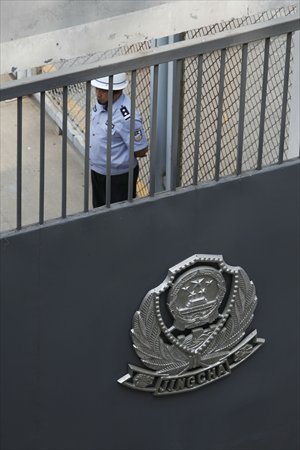Efficiency versus justice

A police officer stands inside the Shijiazhuang Re-education through Labor Center in May, 2012. Photo: CFP
"For the sake of the rule of law and the sake of justice, the re-education through labor system must be abolished."
These were the closing words of an essay penned by Wang Gongyi, the former director of a research institute under the Ministry of Justice, which were published in the Study Times - a publication affiliated with the Party school of the Communist Party of China (CPC) Central Committee - on July 8.
It wasn't the first time he had written on the controversial re-education system; in comments reported earlier this year he pointed out that decision of abolishing the system represents a choice between justice and efficiency.
This difficult choice, coupled with the uncertain signals being sent from the top leadership, the legal gray-zone that the re-education through labor system occupies, and the vested interests involved have conspired to make reform a difficult task. Authorities are now hesitant to publicly announce progress made on reforming or closing down the re-education system.
Yunnan and Shandong provinces, for example, have issued notices of reducing the number of crimes that warrant sending people to these camps. Reports released in July indicated that Shandong camps had consistently been reducing the number of people entering camps every month. But when contacted about the reforms, authorities refused to comment.
Improvements underway
When Meng Jianzhu, secretary of the Commission for Political and Legal Affairs of the CPC Central Committee announced in January that the system would face a "stop," most interpreted this to mean the system is potentially facing the chopping block, or at least, serious reform. Critics and victims of the system were cautiously optimistic.
"Does this mean we won't risk being threatened if we report misbehavior or try to petition?" asked Li Ping (pseudonym), a 50-year-old petitioner who spent almost two years in a Liaoning Province re-education camp in 2009. Li said she reported corruption in a State-owned enterprise, and ended up in a labor camp where she had to work 10 hours a day for around 10 yuan ($1.63) a month.
One critic of the system is Hu Xingdou, a professor with the Beijing Institute of Technology. "Reform, or even abolishment, is a trend in the system. I've noticed that many local governments have already taken steps to reform, such as reducing the number of people in camps," he said.
In February, Yunnan Province announced that certain offenses, largely related to political activities, would no longer warrant time in re-education camps. These offenses included threatening stability, causing unrest via petitioning, and smearing the image of officials. Other crimes however, such as theft, can still result in re-education through labor, but the authorities said the assessment process has become stricter.
However, when reached by the Global Times, Yunnan authorities refused to comment.
Jiang Mingan, a law professor with Peking University, agrees that numbers are dwindling. "Tightening the rules on putting people into the camp and reducing the number of people is a positive gesture showing that re-education through labor is being reformed but it doesn't mean that the system is being changed completely or abolished," Jiang said.
Legal gaps
The system of re-education through labor was created in the 1950s in a bid to punish and educate "counter-revolutionaries" and people found guilty of other political crimes. After the reform and opening-up policy in 1979, detainees began to include people guilty of minor crimes, those with mental disorders and those who were accused of causing social instability.
Jiang pointed out that a key reason why the system remains in place is because it fills gaps between the criminal law and regulations regarding public security. "There are no proper punishments for some offenders who can't be punished according to the law, such as stealing low value goods," Jiang said.
The legal quagmire caused by the re-education through labor system is a complex one. Wang told the IBTimes in January that police aren't necessarily dedicated to bolstering the rule of law. "The main obstacle preventing the abolishment of the re-education system is the conflict between public security organs and the judiciary," he said. "Decisions regarding re-education are made by police. They pursue efficiency and want to solve social problems as quickly as possible. But that causes issues such as infringements of human rights and wrongful convictions. If we abolish the system, then using legal procedures slows down a lot of things," Wang said.
In a few cases, darker motives than a desire for efficiency may be involved. According to a Southern Weekly report five police officers in were convicted in May for embezzling money that was meant to be paid to detainees at a re-education camp in Luzhou, Sichuan Province. The report said that little "re-education" took place at the camp, and instead it was used for cheap labor.
Moving forward
Wang said that in order to abolish the system, the government would have to take a number of measures. New laws would need to be written to fill in gaps in the system, with some offences requiring jail time and some deserving fines. He also said that progress would need to be made on a system of community service, as well as a more efficient court system to quickly deal with minor crimes. An improved system for dealing with juvenile offenders was also suggested.
"We must put any decision to deprive people of their freedom under the rule of law," said Wang.
Other experts believe the re-education system reflects deeper issues facing the nation. "The difficulties in reforming or abolishing the re-education system show how complicated Chinese society has become and how difficult it is to implement not just this reform but any reforms in China," said a commentary by the Wuhan-based Changjiang Daily.